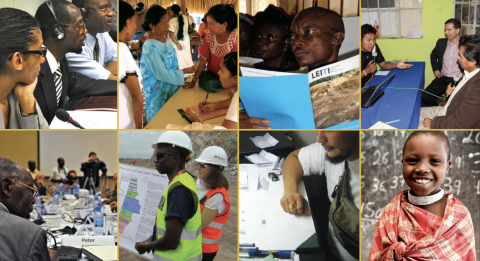
2011 EITI Global Conference
Paris, France, 2-3 March 2011
Transparency counts
EITI Global Conferences are the EITI movement’s biennial coming-together. The 5th EITI Global Conference was held on 2-3 March 2011. It was an opportunity to discuss the impact of the EITI, share lessons learnt from implementation and address future challenges for the EITI. Heads of states, government leaders, companies and civil society organisations, and around 1,000 participants from more than 70 countries gathered at the OECD in Paris to shape the future of the EITI.
The conference – entitled Transparency Counts – focused on how the EITI is making a difference to the nearly half a billion people in the 27 countries who now have access to reliable revenue figures from their country’s natural resources. In most cases, these figures had never been available before. In many cases, the revenue had been the source of bitter conflict, and the source of mismanagement and plunder.
The conference took place against a backdrop of uprisings in resource-rich countries in North Africa demanding more accountability in government; the recent debate about transparency caused not least by the Wikileaks debate; the renewed focus on resource revenue transparency by the French G-20 presidency; and high commodityprices.
The debate oveer mandatory disclosure requirements in the US and Europe also sparked some energy with different positions clearly set out from the very opening plenary. The conference provided a space for these important discussions between key stakeholders.
The conference sought to put national EITI implementation front and centre. The National Exhibition reminded participants that, amongst all the debate on international disclosure requirements, the EITI is making a difference on the ground in 35 countries. And the processes are impressive, as reflected in the materials on display: reports, posters, newspaper articles, videos, radio programmes, cartoons, etc.
By the start of the conference eleven countries - Azerbaijan, Central African Republic, Ghana, Kyrgyzstan, Liberia, Mongolia; Niger, Nigeria, Norway, Timor Leste, and Yemen – were EITI Compliant. In these countries, the EITI had contributed to trust building, improved natural resource governance, civil society engagement and improved business environment. Many other countries were continuing the journey to reach compliance. It was emphasised that the EITI Compliant countries also needed to continue to improve the quality of their reporting and multi-stakeholder dialogue.
The conference objectives included:
- Conveying the impact that the EITI was having in implementing countries through a strong focus on sharing experiences and demonstrating how revenue transparency and the EITI multi-stakeholder process changes countries.
- Giving momentum to policy debates that would shape the future of the EITI such as how EITI reporting can be strengthened and addressing policy issues that have emerged as a result of experiences gained so far.
- Increasing commitment and level of engagement in key outreach countries.
- Endorsing the recommendations of the EITI Board on key policy issues for the EITI including revisions to the EITI Rules.
EITI National Exhibition
The EITI is implemented by 33 governments around the world, and the EITI processes are very different from country to country. This fact that stakeholders in each country own and decide the course of their EITI process, is one of the key features of EITI methodology. During the Global Conference, representatives from implementing countries will be invited to present and share stories from EITI implementation unique to their respective countries. EITI stakeholders from across the world will thus have an opportunity to experience the EITI through 33 different lenses and gain a better understanding of the flexibility of the EITI methodology in terms of adaptation to local context and circumstances.
The event will take shape as an exhibition where each country will have their respective stand during the two days of the conference.



